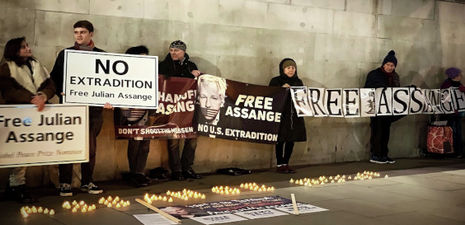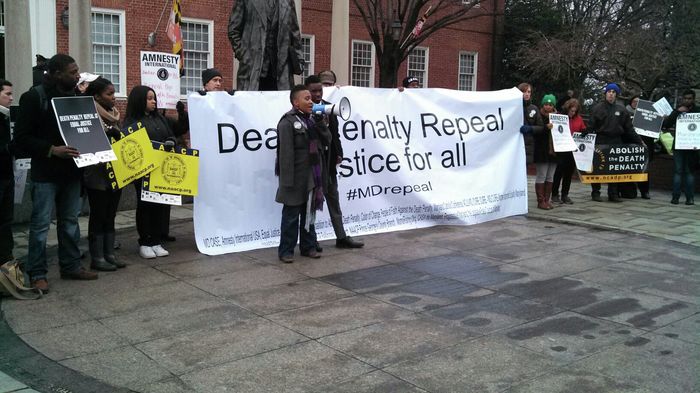Julian Assange avoiding extradition is right, but do not construe this as a victory for press freedom
Following Judge Baraitser’s ruling that Julian Assange should not be extradited to the United States, Talal Hangari cautions that we must not view this decision as a triumph for investigative journalism and press freedom.

Judge Vanessa Baraitser has ruled that Julian Assange will not be extradited to face charges in the United States. This is a good thing. Assange does not deserve to be subjected to the cruelty of the American justice system, which has threatened him with 175 years in prison for exposing the atrocities of the US government.
But Judge Baraitser’s ruling cannot be construed as a victory for press freedom or investigative journalism. She accepted the arguments of the US government prosecution on nearly all of the disputed points of the case. Her ruling claims that Assange transgressed the norms of ordinary journalism, and that his actions could be considered offences in England and Wales. Baraitser rejected arguments that the prosecution of Assange was politically motivated, and that it violated his right to freedom of expression. It is not surprising that the American Justice Department was "gratified that the US prevailed on every point of law raised".
Yet highly reputable human rights and press freedom organisations have asserted that Assange has been subjected to a politically motivated prosecution in order to punish him for exposing the human rights abuses and criminal behaviour of the US government. Reporters Without Borders stated the prosecution was “clearly politically motivated and intended to make an example of Assange and create a chilling effect on media around the world”. Human Rights Watch said the prosecution threatened “basic elements of modern journalism and democratic accountability”, and Amnesty International asserted the prosecution was a “politically-motivated process at the behest of the USA and putting media freedom and freedom of expression on trial”.
“Assange may have been extradited to the United States if his mental health was in a better condition.”
Tim Dawson of the National Union of Journalists said “the judicial instruments being used against Julian Assange are a monstrous attack on press freedom." Nils Melzer, the United Nations Special Rapporteur on Torture, called the case “a huge scandal” representing “the failure of Western rule of law”. Serious questions should be asked about how a British judge could reach such radically different conclusions from those of established press freedom and human rights groups.
Judge Baraitser refused to grant the extradition of Assange to the US on narrow mental health grounds, not because of concerns for freedom of expression or press freedom. In her view, if Assange were held under Special Administrative Measures (SAMs, a euphemism for solitary confinement) in an American prison he would likely commit suicide. Consequently, she ruled “the mental condition of Mr. Assange is such that it would be oppressive to extradite him to the United States of America.” It is disturbing to think that Assange may have been extradited to the US if his mental health was in a better condition.
Assange’s award-winning journalism has made vital contributions to democracy, which cannot survive without free expression and government accountability. WikiLeaks, in revealing classified information about crimes taking place in countries like Iraq and Afghanistan, supported the right of people to scrutinise their governments. Citizens saw behind the smokescreen of “national security” and gained an insight into what was being done in their names.
“It is my view that the factual record is on the side of Assange...”
In Iraq alone, 15,000 previously unknown civilian casualties were brought to light. Reuters reported that media organisations given access to the Iraq War Logs agreed that the documents “showed U.S. forces had effectively turned a blind eye to torture and abuse of prisoners by Iraqi forces." Journalists, women and children were not free from the reach of the US’ indefatigable national security concerns. If democracy endeavours to value press freedom and government accountability, then there can be no doubt that these grievous crimes deserved to have been made public.
The allegations that Assange conspired to crack a password with Chelsea Manning in order to obtain classified documents, and that he indiscriminately published a mass of unredacted files with no concern for the lives of those named in them, have been strongly contested by Assange’s lawyers and the testimonies of a long list of witnesses at his extradition hearing. Readers who are serious about searching for the truth should consult these testimonies and compare them to the account presented by the US government. It is my view that the factual record is on the side of Assange and the wide array of human rights organisations that have come to his defence.
Following the termination of the Swedish investigation of Assange, the task that now remains is to free him from his prolonged confinement. Since December 2010, he has spent 550 days under house arrest, then seven difficult years in the Ecuadorian embassy before being sentenced to 50 weeks in Belmarsh prison in 2019 for violating bail conditions. The United Nations Working Group on Arbitrary Detention has since 2015 voiced the opinion that Assange has been arbitrarily deprived of his freedom. I echo the call of UN Rapporteur Nils Melzer and human rights defenders around the world: ”Mr Assange’s rights have been severely violated for more than a decade. He must now be allowed to live a normal family, social and professional life.”
 News / Cambridge academics sign open letter criticising research funding changes22 February 2026
News / Cambridge academics sign open letter criticising research funding changes22 February 2026 News / Supporters protest potential vet school closure22 February 2026
News / Supporters protest potential vet school closure22 February 2026 News / University Council rescinds University Centre membership20 February 2026
News / University Council rescinds University Centre membership20 February 2026 News / Hundreds of Cambridge academics demand vote on fate of vet course20 February 2026
News / Hundreds of Cambridge academics demand vote on fate of vet course20 February 2026 Comment / A tongue-in-cheek petition for gowned exams at Cambridge 21 February 2026
Comment / A tongue-in-cheek petition for gowned exams at Cambridge 21 February 2026









